What to Know
Chow Chow Lifespan
Chow Chows are known for their unique appearance and independent nature, but how long can you expect your furry friend to be with you? Most Chow Chows live between 8 to 12 years, with some reaching up to 15 years.
Ensuring your Chow Chow has a long and healthy life involves being attentive to their specific health needs and lifestyle.
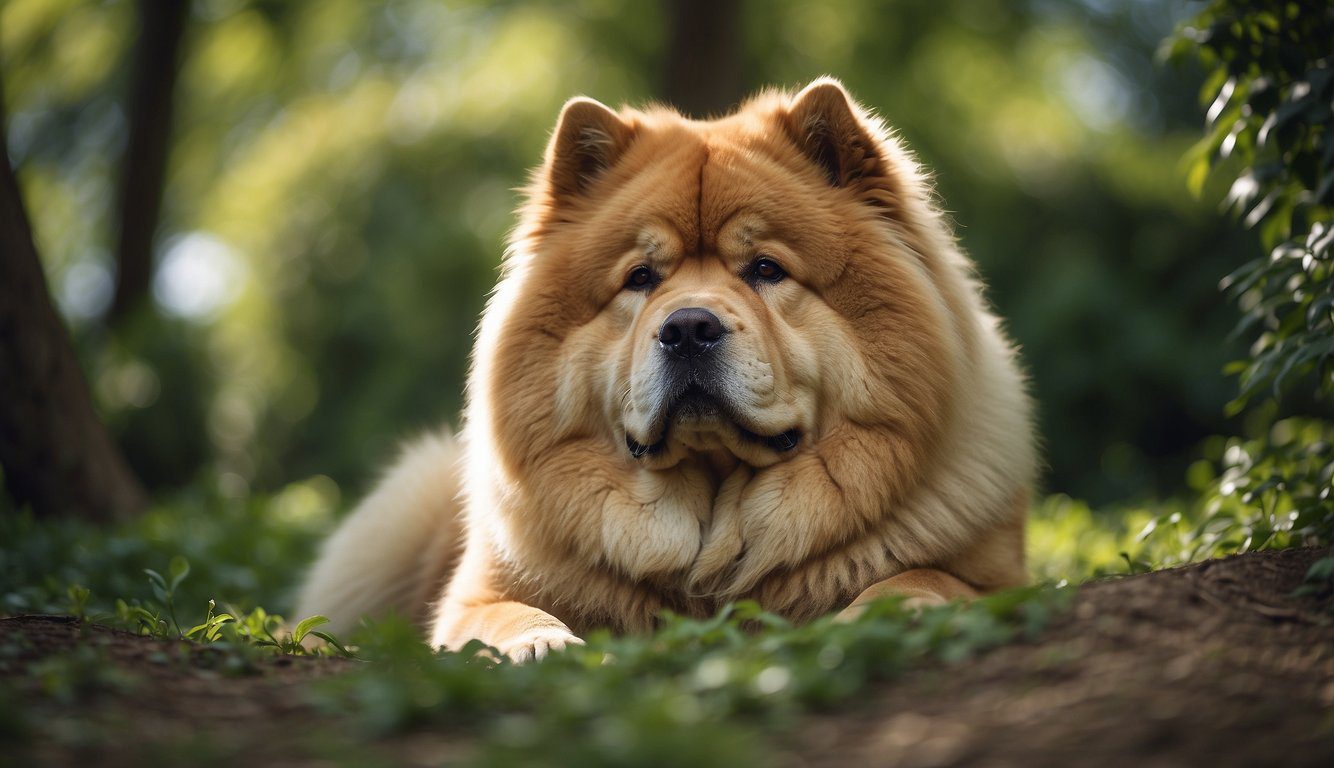
I remember when I got my first Chow Chow, Max. His thick fur and lion-like mane caught everyone’s attention during our walks. Like many Chow Chow owners, I wanted to make sure he lived as long and healthy a life as possible.
By focusing on proper diet, regular exercise, and routine vet visits, Max stayed by my side for over 13 years.
From dealing with common health issues like hip and elbow dysplasia to ensuring they get enough exercise, there are several factors that play into a Chow Chow’s lifespan.
Keeping them healthy requires not only understanding their physical needs but also their mental and emotional well-being.
Key Takeaways
- Chow Chows typically live 8 to 12 years.
- Proper diet, exercise, and vet visits are crucial.
- Mental and emotional well-being is also important.
Understanding the Chow Chow
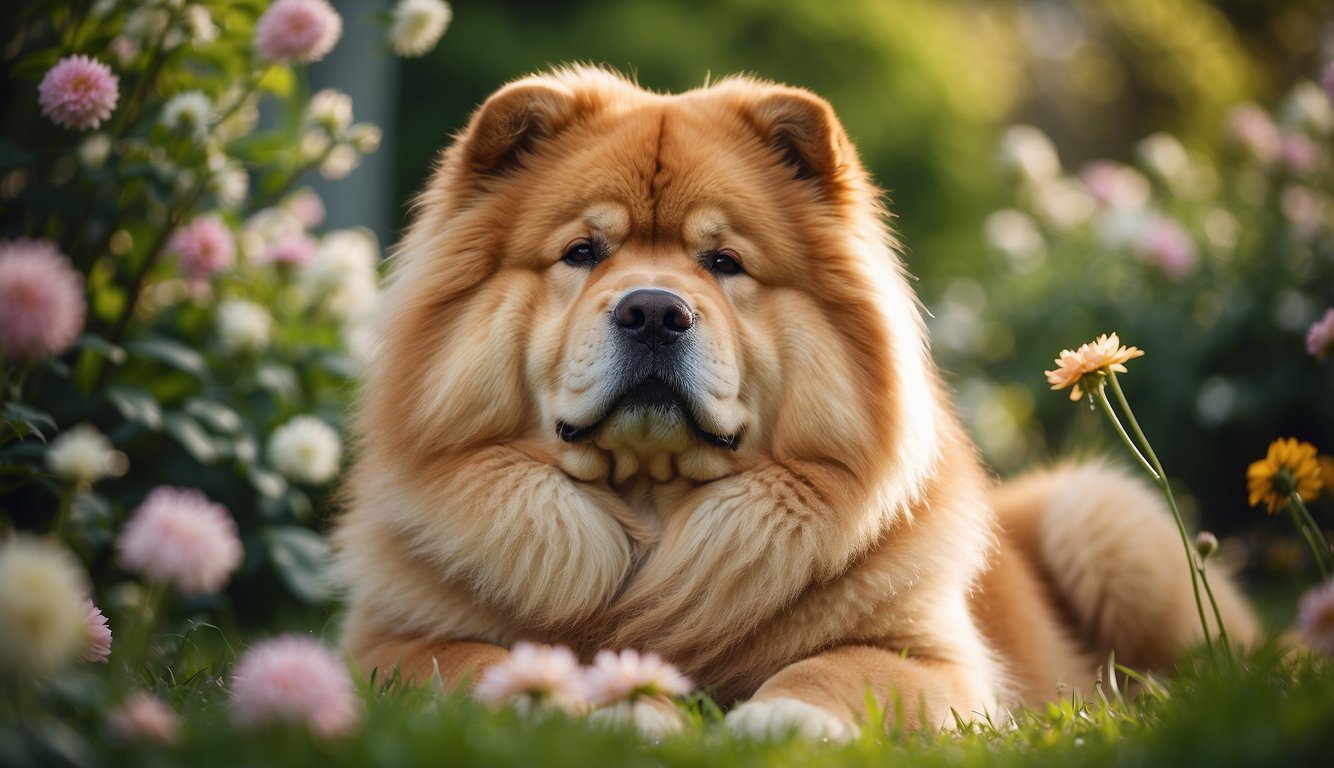
The Chow Chow, known for its unique appearance and independent nature, is a breed with a storied history. It’s important to understand the characteristics and historical significance of Chow Chows to ensure they live a long, healthy life.
Breed Characteristics
Chow Chows are known for their lion-like mane thanks to their dense double coat. They come in various colors including red, black, blue, cinnamon, and cream. Their blue-black tongue is a distinctive feature.
These dogs are of a medium size, typically weighing between 45 to 70 pounds.
Chow Chows are highly independent and not very interactive, which might make them seem aloof. They are extremely loyal to their family but can be wary of strangers. If you envision your pet following you around everywhere, a Chow Chow might surprise you.
They’re also known to be quite dignified and prefer observing from a distance rather than engaging in rowdy play.
Historical Significance
The origins of Chow Chows can be traced back to ancient China, where they were bred for various purposes including hunting, guarding, and pulling sleds.
In Chinese art, Chow Chows were often depicted alongside idiosyncratic figures, symbolizing their significance.
When Queen Victoria of England received a Chow Chow as a gift in the late 1800s, the breed’s popularity soared in the Western world.
Their historical ties and evolution highlight their resilient and hardy nature, which is reflected in their unique temperament and roles even today.
Determinants of Lifespan

When it comes to Chow Chow lifespan, several factors play critical roles. These include genetics, prevalent health issues, and the level of care and environment the dog receives.
Genetics and Hereditary Conditions
Genetics can significantly impact a Chow Chow’s lifespan.
My neighbor’s Chow Chow had inherited hip dysplasia, which is common in the breed. Unfortunately, this genetic condition can shorten their lives. Some Chow Chows are also prone to hereditary eye problems, like entropion, where the eyelid rolls inward.
Keeping track of family history can be essential.
It’s important to get puppies from reputable breeders who screen for these conditions. By doing so, you can help ensure the future health of your furry friend.
Common Health Issues
Chow Chows can suffer from several health issues.
I recall a friend whose Chow Chow struggled with hypothyroidism. This condition affects their energy levels and metabolism.
Another common issue is skin problems, often due to allergies. These dogs also have a predisposition to develop gastric torsion, or bloat, which is life-threatening if not treated quickly.
Regular vet visits are crucial for early detection and treatment. Knowing these common health issues can prepare you to act promptly.
Importance of Care and Environment
The care and environment a Chow Chow receives are vital for a long and healthy life.
When I cared for my Chow Chow, I made sure she had a balanced diet and daily exercise. This helped her maintain a healthy weight.
Something as simple as grooming can also make a big difference, given their thick coats.
Keeping their living environment clean and stress-free is equally important. All these aspects not only improve their quality of life but can also extend their lifespan.
Health and Wellness

Taking care of a Chow Chow’s health and wellness is crucial to ensuring they live a long and happy life.
This involves catering to their nutrition, exercise needs, and regular veterinary check-ups.
Nutrition and Diet
I’ve found that a balanced diet is essential for the health and longevity of Chow Chows.
These dogs can be prone to obesity, so it’s important to provide a diet that is rich in protein but low in fat.
High-quality kibble combined with fresh ingredients like lean meats, vegetables, and some grains work well.
It’s important to avoid feeding them table scraps or foods high in salt and sugar.
I also make it a point to measure their food portions to avoid overfeeding. Given their sensitivity to digestive issues, regular meals at set times help maintain good digestive health.
Foods rich in omega-3 fatty acids, like fish oil, can help maintain a healthy coat and skin.
Remember, the right diet can significantly impact their overall health and well-being.
Exercise and Activity
Chow Chows need regular exercise to stay fit, but they are not the most energetic dogs.
A couple of moderate walks a day, along with some playtime, usually suffices. They enjoy a routine, so sticking to a daily schedule can be helpful.
I also like to incorporate engaging activities like puzzle toys that stimulate their minds and keep them active.
Since they can be prone to joint issues like hip dysplasia, it’s important not to over-exercise them, especially during their puppy years.
Also, during hot weather, exercise should be limited to avoid overheating, as their thick fur makes them prone to heat exhaustion.
Veterinary Care and Check-Ups
Routine veterinary check-ups are absolutely vital for a Chow Chow’s health.
Regular visits help catch health issues early on, which is crucial for conditions like hip and elbow dysplasia, skin infections, and eye problems.
My vet and I have a schedule where we do a full check-up every six months.
Vaccinations and parasite prevention measures should be up-to-date to keep them protected.
I also make sure to have their eyes checked regularly as Chow Chows are prone to eye conditions like entropion.
Frequent grooming and skin checks at home can help detect infections or other issues early.
It’s always best to be proactive rather than reactive when it comes to their health.
Preventive Health Strategies

Chow Chows can live healthy lives with the right preventive health strategies.
Focusing on regular vaccinations, effective parasite control, and proper grooming can help reduce common illnesses and extend their lifespan.
Vaccination and Parasite Control
Keeping up with vaccinations is crucial for Chow Chows. Regular shots protect them from severe infections like rabies, distemper, and parvovirus.
I always schedule vaccines according to my vet’s recommendations.
Parasite control is just as vital. Fleas, ticks, and worms can cause discomfort and serious health issues.
Monthly treatments help prevent these pests from taking over. I’ve found that using a vet-recommended flea and tick collar has been incredibly effective.
Regularly check for parasites, especially after outdoor activities.
Dealing With Common Illnesses
Chow Chows are prone to certain health problems, such as hip dysplasia and skin infections.
Early detection is key. Regular veterinary check-ups help catch issues before they become severe.
For example, I once noticed a slight limp in my Chow Chow and a quick vet visit helped us manage early hip dysplasia effectively with medication.
It’s also essential to monitor their eating and behavior patterns. Changes can signal underlying health problems.
I make it a point to observe my pet daily. If your Chow Chow starts scratching more than usual, it could be a skin infection and you’ll need to visit the vet.
Dental Health and Grooming
Dental health is often overlooked but is critically important. Poor dental hygiene can lead to periodontal disease, causing pain and stress.
I brush my Chow Chow’s teeth regularly using dog-friendly toothpaste. Dental treats also help keep their teeth clean.
Grooming is another must. Regular grooming keeps their coat healthy and reduces stress.
I brush my Chow Chow’s thick fur at least twice a week to prevent matting and skin infections. Bathing them with a dog shampoo designed for sensitive skin helps keep their coat shiny and free from parasites like fleas.
Personal experience has taught me that a well-groomed Chow Chow is a happy and healthy pet.
Regular grooming sessions are a perfect time to check for lumps, bumps, or any signs of illness. This routine helps in catching potential health issues early.
Behavioral and Social Factors

Understanding and addressing the behavioral and social needs of a Chow Chow can greatly impact their lifespan and overall well-being.
Socialization, training, and managing separation anxiety are key factors to consider.
Importance of Socialization
Chow Chows are known for being somewhat aloof and independent. I remember when I first brought my Chow Chow puppy home, I realized how important early socialization was.
Regular walks, playdates, and introducing them to different environments can build confidence and reduce stress.
Socializing a Chow Chow means exposing them to different people, other animals, and various settings. This not only prevents aggressive behavior but also makes them more adaptable and stress-free.
A well-socialized dog is less likely to develop anxiety-related health issues over time.
Socialization should start when they are puppies, but it’s never too late to begin. Even adult Chow Chows can benefit from new, positive experiences.
Remember, a happy and social Chow Chow is a healthy Chow Chow.
Training and Mental Stimulation
When it comes to training a Chow Chow, patience is key. These dogs have a strong-willed nature, but with consistent training, they can learn effectively.
I once spent hours teaching my Chow basic commands and tricks, and the bond we formed during this time was priceless.
Training isn’t just about commands; it’s about mental stimulation too.
Provide interactive toys, puzzle feeders, and engage in activities that challenge your Chow Chow’s mind.
Regular training sessions combined with mental stimulation can keep your dog sharp and improve their overall behavior.
Using positive reinforcement, like treats and praise, can make a big difference.
A well-trained Chow Chow is not only more obedient but also less likely to develop behavioral problems. This, in turn, helps them lead a stress-free, longer life.
Handling Separation Anxiety
Chow Chows can be prone to separation anxiety if not properly managed.
I remember the first time I left mine alone; the howling and scratching were heartbreaking.
This anxiety can lead to destructive behaviors and even affect their health.
One way to handle separation anxiety is by gradually getting your Chow used to being alone. Start with short periods and slowly increase the time.
Creating a safe and comfortable space with their favorite toys can also help.
You might use calming aids or leave a piece of clothing with your scent to comfort your Chow. Regular exercise before you leave can tire them out, reducing anxiety.
It’s also important to avoid long, dramatic goodbyes, as this can heighten their stress.
Life Stages and Care
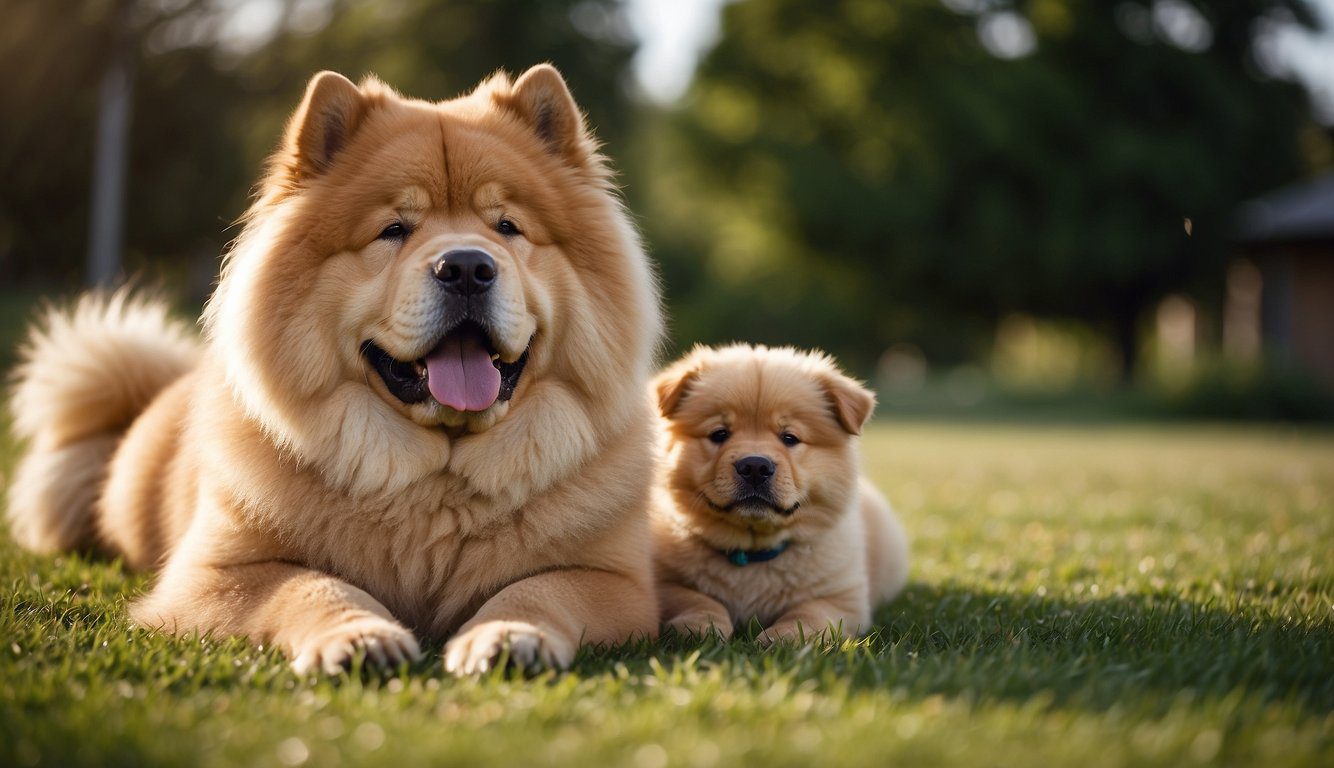
Chow Chows go through different life stages, each requiring specific care. Puppies need lots of exercise, while older dogs need special veterinary care and attention.
From Puppyhood to Adulthood
When I first got my Chow Chow puppy, I focused on providing the right care to ensure he would grow up healthy.
For puppies, exercise is crucial. I made sure he had plenty of time to play and explore in a safe environment.
Regular walking and playtime help them burn off energy and develop strong muscles.
Diet is also important. I fed my Chow Chow a balanced diet with high-quality puppy food. It gave him the nutrients needed for growth.
Veterinary care can’t be overlooked. I scheduled regular check-ups to stay ahead of any health issues. Vaccinations and preventive treatments protected him from common illnesses.
Senior Chow Chows and Aging
As my Chow Chow got older, his care needs changed.
Senior Chow Chows, typically over eight years old, may start showing signs of aging. Reduced activity levels and difficulty in moving can be common.
Regular, gentle exercise like short walks kept him active without causing strain.
Veterinary care became more important. I scheduled bi-annual check-ups to monitor his health.
Conditions like hip dysplasia and arthritis are common in larger breeds, so early detection and treatment were essential.
A senior diet with lower calories and joint supplements helped maintain his weight and joint health.
I also made my home more comfortable. Adding ramps and soft bedding provided ease and comfort.
Breeding and Adoption Considerations
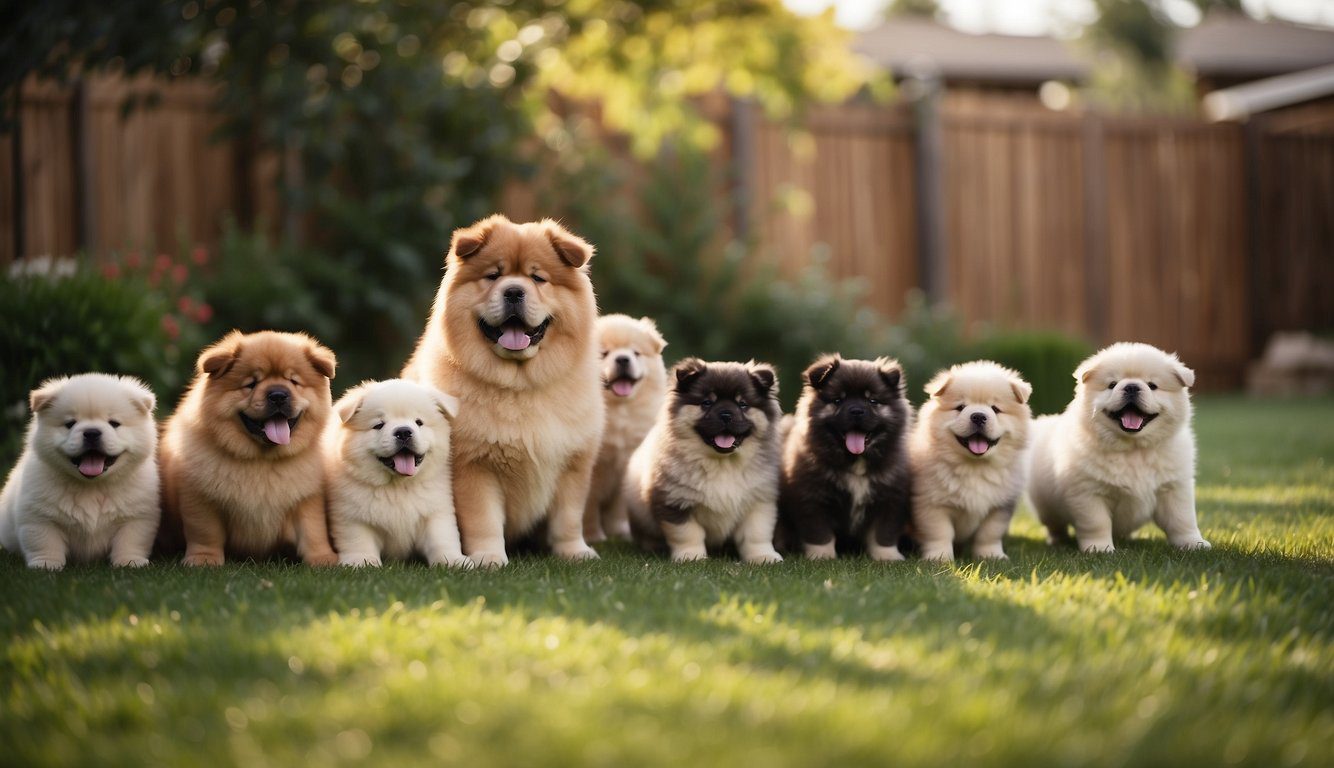
When getting a Chow Chow, it’s crucial to make informed choices about breeders and adoption. The quality of life for a Chow Chow starts with these decisions.
Choosing a Reputable Breeder
Finding a reputable breeder is essential. I always encourage people to avoid puppy mills, where dogs often suffer from poor conditions.
Instead, look for breeders who are transparent about the health and temperament of their dogs.
A good breeder will provide health screenings for common Chow Chow health conditions, such as hip dysplasia and eye issues.
Visiting the breeder’s facility can give you a sense of how they treat their animals.
The puppies should be clean, active, and socialized. They should also spend time with their mother and littermates to develop social skills.
A reputable breeder will also offer support and guidance as you raise your puppy. They should be willing to answer questions and provide resources.
Always ask for references from previous buyers to ensure you are dealing with a responsible breeder.
Adoption and Rescue Options
Adoption is a wonderful alternative to buying from a breeder. Many Chow Chows in shelters need loving homes.
Adopting an older dog can be rewarding, as shelters often provide detailed information about the dog’s temperament and health history.
Rescue organizations can be particularly helpful. They often specialize in specific breeds and have a good understanding of Chow Chows.
They might also offer resources for training and care, ensuring a smooth transition for both the dog and the owner.
When adopting, consider the dog’s background and any special needs they might have.
Some rescue dogs have had difficult pasts and may require extra care and patience.
The key is to create a happy Chow Chow environment where the dog feels safe and loved.
Active Living and Quality of Life
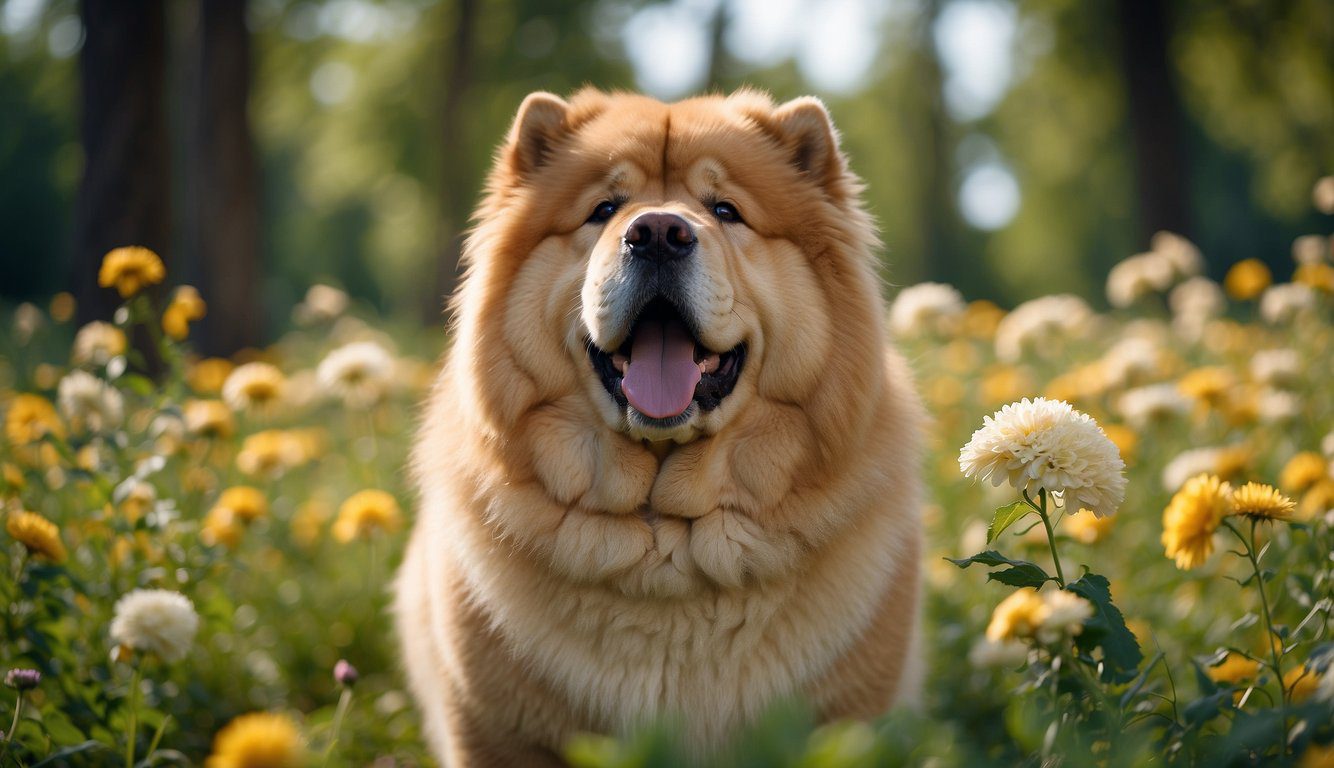
To ensure a long and happy life for your Chow Chow, integrating active living and quality care into their daily routine is crucial. This includes interactive play, enriching their environment, and ensuring their comfort and happiness.
Interactive Play and Bonding
Interactive play is essential for a Chow Chow’s physical and mental health. Daily walks and engaging games can keep them active.
I’ve found that Tug-of-war and fetch are great for exercise.
Five benefits of interactive play:
- Physical exercise: Keeps their weight in check.
- Mental stimulation: Prevents boredom and destructive behaviors.
- Strengthens bond: Creates a strong connection.
- Social skills: Helps them interact better with other pets and people.
- Training opportunities: Practice commands and obedience.
Playtime isn’t just fun for them; it’s a great way for us to connect. One game my Chow Chow loves is hide and seek.
Environmental Enrichment
Creating an enriched environment helps keep a Chow Chow mentally stimulated. Different toys, puzzle feeders, and safe outdoor spaces can make a big difference.
Tips for enriching their environment:
- Variety of toys: Rotate toys to keep interest high.
- Puzzle feeders: Stimulate their intelligence and curiosity.
- Safe outdoor spaces: A fenced yard where they can roam safely.
- Scents and sounds: Use items that offer new smells and noises.
I’ve seen that changing the walking routes and introducing new smells in the backyard can excite their senses. This not only improves their quality of life but also keeps them more content.
Ensuring Comfort and Happiness
Comfort is about more than a cozy bed; it’s about overall well-being.
Regular vet visits, a balanced diet, and a stress-free environment are key.
Steps to ensure their comfort:
- Routine vet visits: Catch any health issues early.
- Balanced diet: Nutritious food tailored to their needs.
- Safe spaces: Areas where they feel secure.
- Grooming: Regular brushing to maintain their coat.
- Affection: Daily cuddles and pats.
When my Chow Chow has a comfortable bed and plenty of love, he’s not just healthier but also much happier.
FAQs

Chow Chows have unique lifespans, health issues, and behaviors that prospective and current owners might be curious about. This FAQ section will explore these topics in detail.
How long do male Chow Chows typically live?
Male Chow Chows usually live between 8 and 12 years. Factors like genetics, diet, and regular vet check-ups influence their lifespan.
From my own experience, giving them a balanced diet and lots of love can really make a difference in their longevity.
What’s the average life expectancy of female Chow Chows?
Female Chow Chows live about the same as males, around 8 to 12 years.
I’ve noticed that their lifespan can extend with proper care and regular health checks. Healthy lifestyle choices play a crucial role in their well-being.
Can you tell me about the health issues commonly seen in Chow Chows?
Chow Chows often face health issues like hip and elbow dysplasia, skin infections, and obesity.
Frequent vet visits and a good diet are essential.
I remember dealing with hip dysplasia in my Chow, making exercise and weight control vital parts of his routine.
Do Chow Chows require a lot of companionship, or can they handle being alone for some periods?
Chow Chows value their independence but also enjoy companionship.
They can handle being alone for a few hours, but too much isolation can lead to behavioral issues.
From my experience, balancing alone time and social interaction is key to a happy Chow Chow.
What are some behavioral quirks to be aware of in Chow Chows?
Chow Chows can be aloof and stubborn. They often have a strong sense of territory and can be wary of strangers.
Training and socialization from an early age help manage these traits. My Chow had a funny habit of claiming the couch as his throne, asserting his dominance in the cutest way.
How does the lifespan of a mixed-breed Chow compare to a purebred?
Mixed-breed Chow Chows might have a slightly longer lifespan due to genetic diversity. Their lifespan ranges from 9 to 15 years.
Purebreds face higher risks of genetic health issues. I’ve seen mixed-breed Chows leading active lives well into their teens, owing to fewer hereditary health problems.

